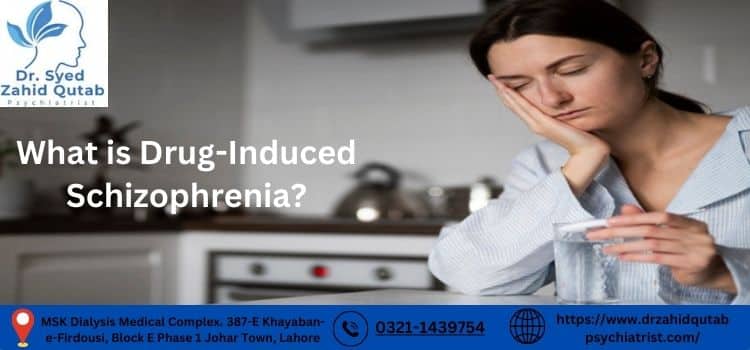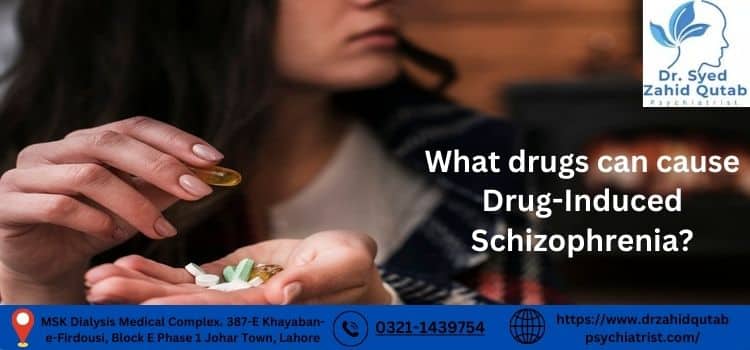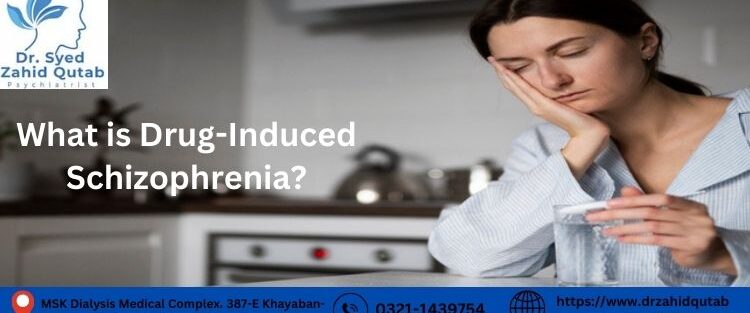If you have been diagnosed with schizophrenia, or think you may be suffering from it, it is important to understand the different types of this disorder and any potential causes. One type is known as Drug-Induced Schizophrenia. so what is Drug-Induced Schizophrenia?
This form of schizophrenia may not always seem apparent but can arise due to long-term drug use that has caused chemical changes in the brain impacting its functioning. In this blog post, we will discuss this disorder and its treatment in detail.
Read more to get further details.
What is Drug-Induced Schizophrenia?

It is a form of schizophrenia that can occur due to long-term drug use. This disorder may not always be apparent at first, but over time, the chemical changes caused by the drug abuse can impact the brain’s functioning and lead to symptoms of schizophrenia.
How does Drug-Induced Schizophrenia differ from other types of schizophrenia?
There are many different types of schizophrenia, and It is just one of them. Unlike other forms of the disorder, this type is directly caused by long-term drug use. Other types may have underlying genetic or environmental causes.
What drugs can cause Drug-Induced Schizophrenia?

Any type of drug can potentially cause Drug-Induced Schizophrenia, but there are certain types of drugs that have been linked to a higher risk of developing this disorder. These include:
- Psychostimulants such as cocaine and amphetamines
- Hallucinogenic drugs, such as LSD and PCP
- Antiepileptic drugs
- Long-term use of marijuana and alcohol can also increase the risk.
- Further drugs include prescription drugs like steroids, antidepressants, and antipsychotics.
Symptoms of Drug-Induced Schizophrenia
The negative symptoms of Drug-Induced Schizophrenia can vary from person to person, but they generally resemble those of other types of schizophrenia. These can include:
- Paranoid Delusions
- Visual Hallucinations or Auditory Hallucinations
- Overthinking
- Disorganized thinking and speech
- Lack of motivation or interest in activities
- unusual behavior
- Social withdrawal and isolation
- Catatonic behavior
- Lack of performance in daily life activities
Effects of Drug-Induced Schizophrenia.
Drug-Induced Schizophrenia can have a significant impact on an individual’s life, including their relationships, work or school performance, and overall mental health. It is important to seek treatment as soon as possible to manage the symptoms and prevent any further progression of the disorder.
This disorder can further lead to mental health disorders like anxiety disorder, mood disorder, or bipolar disorder.
Can you recover from drug-induced schizophrenia?
While there is no known cure for Drug-Induced Schizophrenia, it is possible to manage the symptoms through a combination of medication and therapy. With proper treatment and support, many individuals with this disorder can lead fulfilling lives. However, it is crucial to seek help early on to increase the chances of successful recovery.
Treatment Options for Drug-Induced Schizophrenia
The first step in treating Drug-Induced Schizophrenia is to stop the use of the drug that caused the disorder. This can help prevent any further damage to the brain and decrease the severity of symptoms. After this, a combination of medication and family therapy may be recommended, including:
- Antipsychotic medications: These can help manage symptoms such as hallucinations and delusions.
- Mood stabilizers: These can help regulate mood and behavior.
- Cognitive-behavioral therapy (CBT): This type of therapy aims to change patterns of thinking and behavior to better manage symptoms.
- Support groups: Connecting with others who have experience with Drug-Induced Schizophrenia can provide valuable support and understanding.
Prevention Strategies
While it may not always be possible to prevent Drug-Induced Schizophrenia, there are steps that can be taken to decrease the risk of developing this disorder. These include:
- Avoiding drug use: The best way to prevent Drug-Induced Schizophrenia is to avoid using drugs or misusing prescription medications.
- Seeking help for substance abuse: If you are struggling with substance abuse, seeking help and treatment can prevent long-term damage to the brain and decrease the risk of developing Drug-Induced Schizophrenia.
- Managing stress: Stressful situations can trigger symptoms of this disorder, so finding healthy ways to cope with stress is important. This could include exercise, relaxation techniques, or therapy.
- Monitoring medications: If you are taking any medications, make sure to closely follow your doctor’s instructions and report any unusual side effects.
Triggers of Drug-Induced Schizophrenia
While drug use is the main trigger of this type of schizophrenia, there are other factors that may contribute to its development. These include:
- Genetics: Some individuals may have a genetic predisposition to developing Drug-Induced Schizophrenia.
- Environmental factors: Growing up in a chaotic or dysfunctional environment can increase the risk of developing this disorder.
- Traumatic experiences: Traumatic events, such as physical or emotional abuse, can also contribute to the development of Drug-Induced Schizophrenia.
Conclusion
Drug-Induced Schizophrenia is a complex disorder that requires proper diagnosis and treatment. Understanding what is Drug-Induced Schizophrenia its potential causes and risk factors can help individuals take steps to prevent this disorder from developing.
Seek professional help if you think you may be experiencing symptoms of Drug-Induced Schizophrenia or are struggling with substance abuse. Remember, it is never too late to seek help and take control of your mental health.
FAQs
Some of the frequently asked questions by people are mentioned below:
What drugs can cause schizophrenia?
The drugs that have been linked to a higher risk of developing schizophrenia include cannabis, amphetamines, and LSD.
What is the difference between schizophrenia and drug-induced schizophrenia?
Schizophrenia is a chronic mental disorder that can occur without substance abuse. On the other hand, Drug-Induced Schizophrenia is caused by long-term drug use and may resolve with abstinence from drugs.
Can drug-induced schizophrenia go away?
With proper treatment and abstinence from drugs, it is possible for Drug-Induced Schizophrenia to go away. However, this may vary depending on the individual and the severity of their condition.
What age is drug-induced schizophrenia?
Drug-Induced Schizophrenia can occur at any age, but it is often seen in individuals who have a family history of drug abuse and are in their late teens or early twenties. However, this disorder can also develop later in life due to prolonged drug use.
How do you treat drug-induced schizophrenia?
Treatment for Drug-Induced Schizophrenia typically involves a combination of medication, therapy, and lifestyle changes. The goal is to manage symptoms and address any underlying substance abuse issues.
How is the brain of a schizophrenic different?
People with schizophrenia may have structural and functional differences in the brain compared to those without the disorder. These differences can impact how the brain processes information and may contribute to symptoms of schizophrenia such as delusions and hallucinations.
What are the examples of drug-induced psychosis?
Some examples of drugs that can induce psychosis include cannabis, amphetamines, and LSD. These substances can cause chemical changes in the brain that can lead to psychotic symptoms similar to those seen in schizophrenia.

